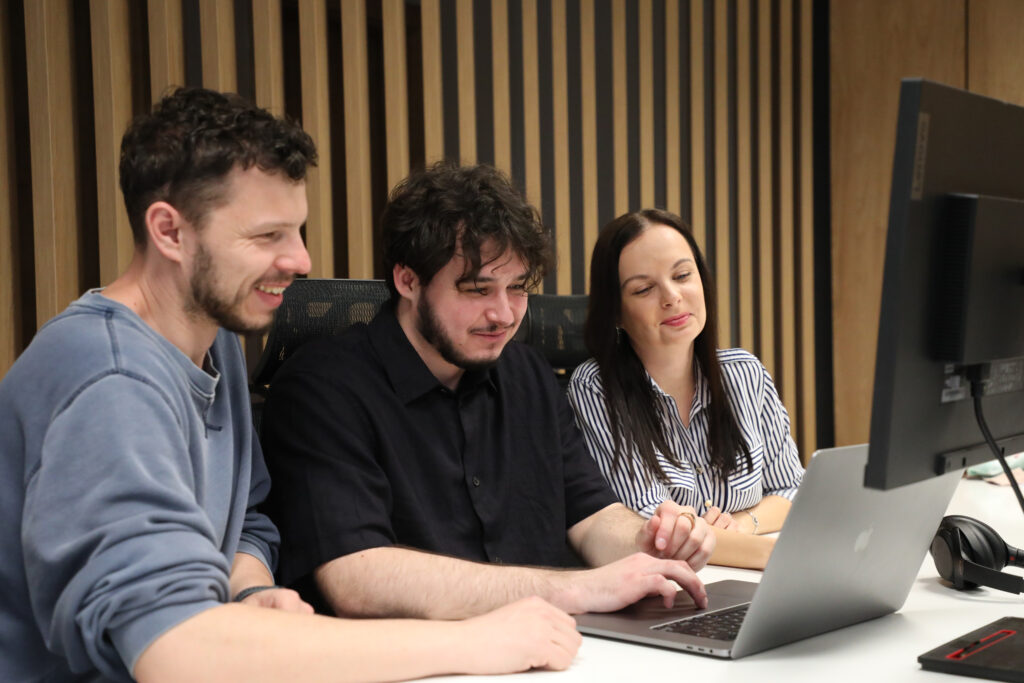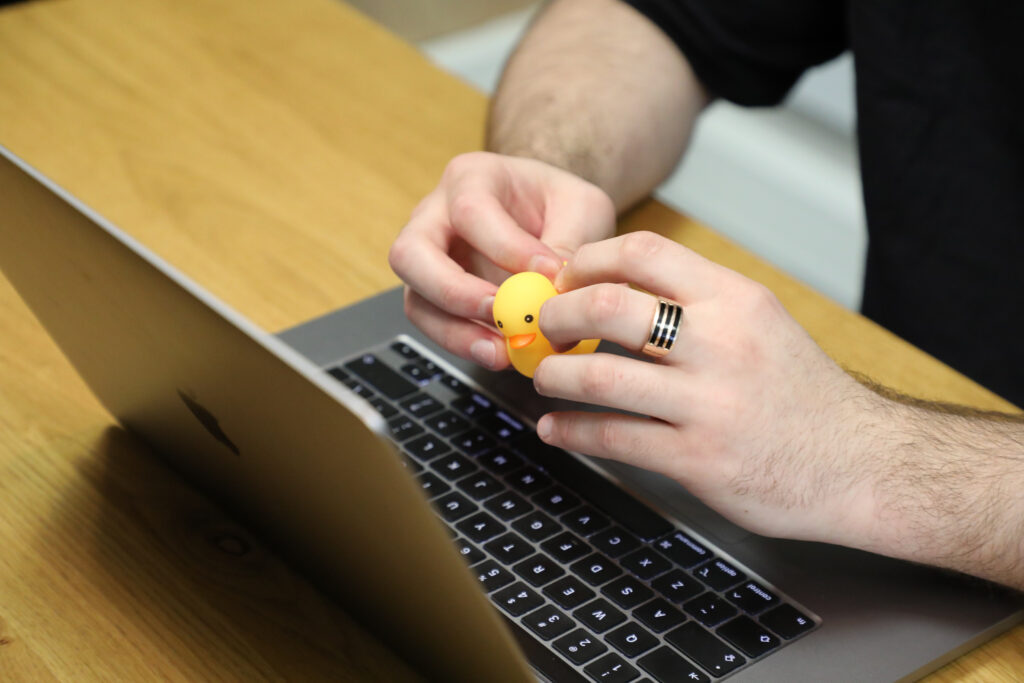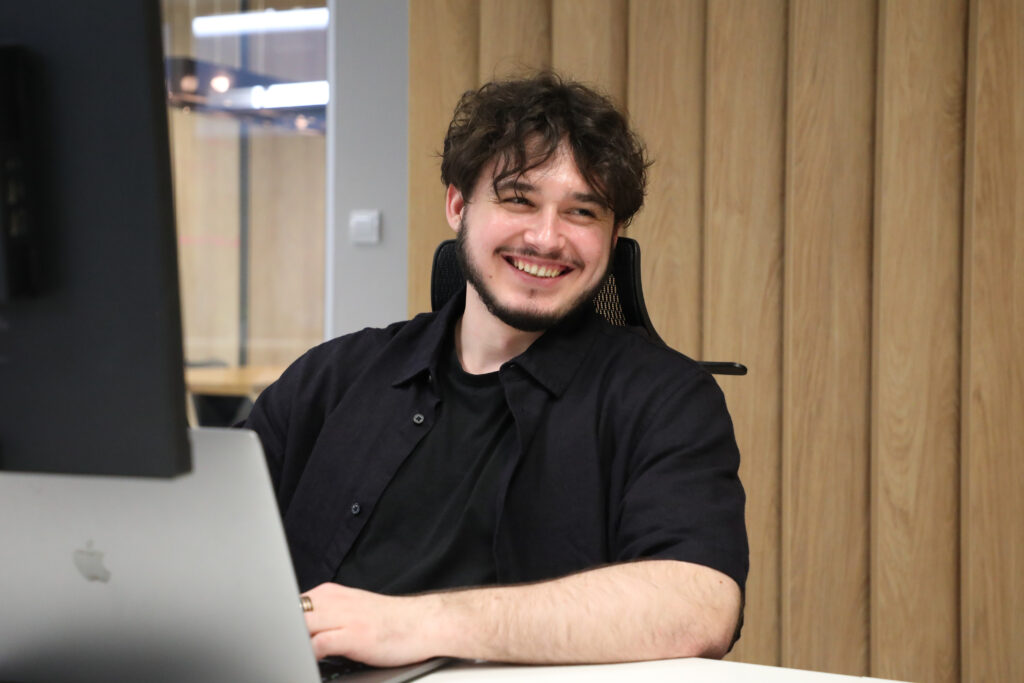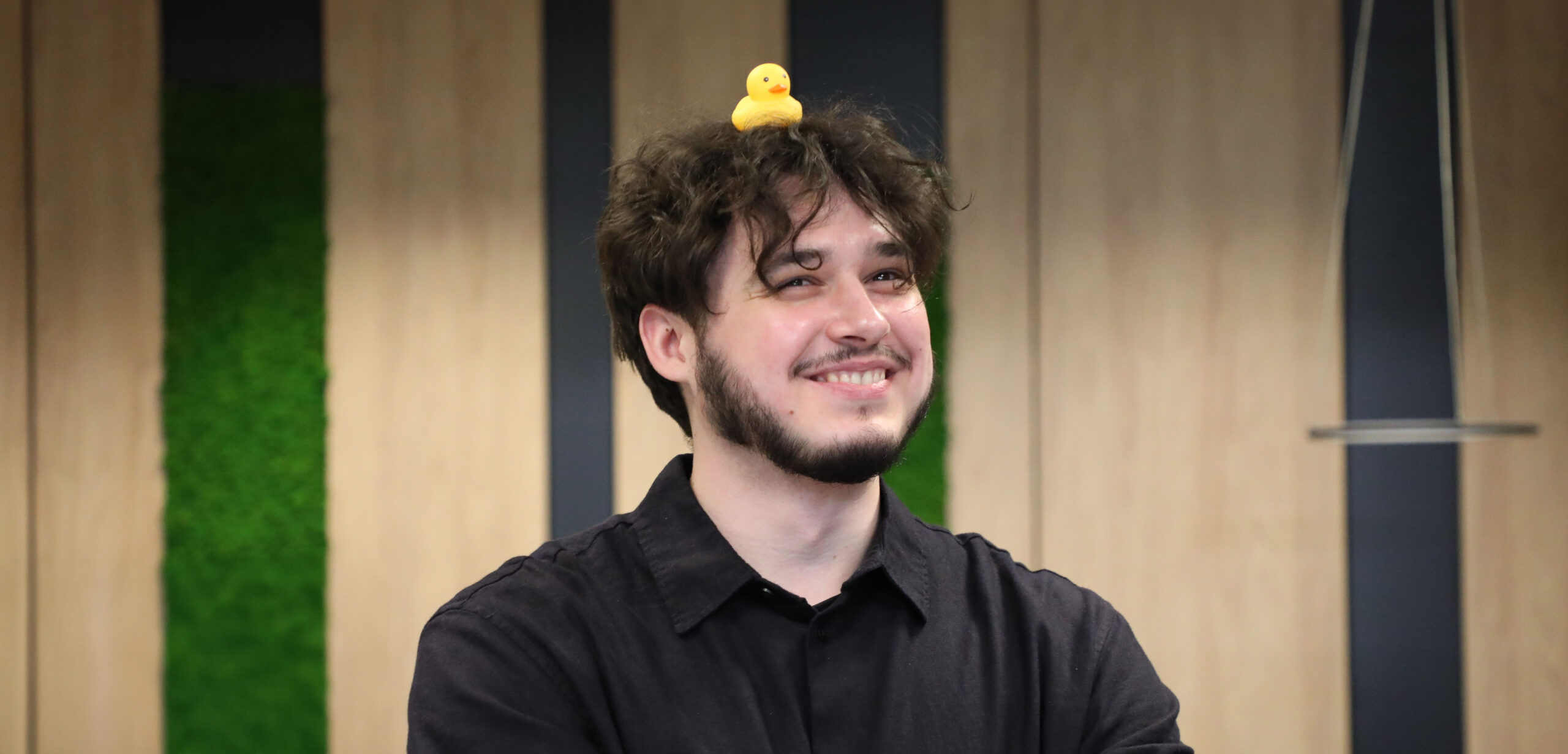He’s the kind of teammate who doesn’t panic when things go sideways. In fact, that’s usually when Ihor Bondarenko shines the most — quietly analyzing the problem, rubber duck in hand (more on that later), and confidently working his way toward a solution. Originally from Ukraine and now finishing his Master’s at Technická univerzita v Košiciach, Ihor joined our team as a Junior Software Engineer. But his growth mindset, team-first attitude, and hands-on approach to learning already reflect the spirit of a future leader in tech.
Let’s dive into his story — the thoughtful kind, peppered with good insights, dry humor, and a serious respect for karaoke.
What brought you to the IT world?
I’ve always been fascinated by how things work, especially when it comes to computers. I remember spending hours as a kid in front of the monitor, figuring things out — from installing the games I wanted to tweaking software settings — always trying to understand why things didn’t work and how to fix them. But it wasn’t until university that I realized IT could actually be my career path. I saw my classmates already working part-time in tech jobs while studying, and it made me think — why not me?
Looking back, there wasn’t really any other choice for me — applying to study computer science just made sense. I’d always been interested in it.
At first, I hesitated because I felt like I didn’t know enough. But I eventually realized that no one starts with all the knowledge. You learn by doing. So I started applying, trying internships, and getting hands-on with real code. That’s when things started. So I started applying. After a while, I received my first offer and began getting hands-on with real code.
What was your biggest challenge when entering the IT world?
The biggest challenge was in my own head. I thought I had to master everything before I could even try applying for a job. That mindset held me back at the beginning.
But then I realized — waiting until you feel “ready” just delays your growth. The real learning starts when you’re inside the project, working with a team, and facing actual problems that need solving. That shift in thinking helped me take the leap. I stopped overpreparing and started participating — and that’s where real progress began.
How do you manage your time and energy between studies and hands-on tech projects?
Honestly, I don’t have a perfect time-management system — I just stay clear on my priorities. Hands-on tech work is what matters most to me, so that’s where most of my energy goes. During the day, my main focus is on it, and if I have university tasks, I’ll fit them in during the evenings or weekends, depending on my mood and the energy I have left after work.
If a university class is interesting or feels useful to me, I spend more time on it, giving it my best. But if it’s not, I’ll just do the minimum to get by. It’s become normal for me to leave things until the last minute and then speed-run my studying a couple of hours or days before the exam. It’s not perfect, but it works for me and helps me save energy for what actually matters.
What’s your approach to learning — are you more of a deep diver, or do you prefer learning by doing and hands-on approach?
I used to be more of a deep diver when I started my path as a software engineer. I thought I needed to fully understand something before I could use it, and it felt more structured and safer that way. But that approach ended up slowing me down.
I saw two kinds of learners around me — some were like me, diving deep into theory, while others just jumped in and figured things out as they went. At first, I couldn’t understand how they were doing that, but over time, I saw how much faster they were growing.
Eventually, I naturally shifted toward learning by doing. It wasn’t some big, life-changing moment — just a gradual shift. I still believe that you need to know the basics of a subject in depth — that’s your foundation. But tech moves fast, and most other things can be learned along the way. You just have to keep up and stay current.

Are there any learning strategies or tools you’ve found especially helpful that others might overlook?
Definitely AI. I use it every day — for work and for other things too. It’s a huge time-saver when you know how to use it right. I often use it to refactor code, help with monotonous tasks, generate ideas, and more. It’s not about using AI blindly — you have to know how to evaluate the results and understand that it can be wrong. That awareness is key.
And again, it all comes back to the basics. If someone junior is using AI for everything without understanding how to process what they get back, it’s not going to help them long-term. The foundation still matters.
Also, one of the most underrated learning strategies is just talking to people. Whether it’s coworkers, friends, or online communities, discussing problems or getting feedback often leads to breakthroughs. Learning is a social process — you don’t have to do everything on your own.
You relocated from Ukraine — how has that shaped your perspective on growth, learning, or collaboration?
Relocating from Ukraine, when I had just turned 17, really pushed me out of my comfort zone. I was more introverted back then, and being in a completely unfamiliar environment, without any familiar faces, was a pretty intense experience.
But that whole situation shaped me more than I expected. It taught me to adapt to different cultures, different ways of thinking, and different styles of communication. It made me realize that real growth usually comes from discomfort. When I pushed through that phase, I started seeing challenges as opportunities instead of threats.
It also gave me a better appreciation for collaboration. Working with people from different backgrounds can be hard, but it leads to better solutions. Everyone brings something unique to the table, and the more open you are to different perspectives, the stronger your team becomes.
What keeps you motivated when things get tough — whether it’s a tricky problem, a tight deadline, or a long day?
What keeps me going is simple — I genuinely enjoy what I do. If you like the work itself, even long days don’t feel that long.
Of course, I run into tricky moments like anyone else. When that happens, I remind myself that the hard parts are usually where the most growth happens. It might feel frustrating in the moment, but it’s part of the process.
Also, my team plays a big role. I work with people who are more experienced than I am, and I learn from them constantly. They’re supportive, helpful, and always willing to jump in if I get stuck. That kind of environment keeps you motivated.

When you’re faced with something completely unfamiliar, what’s your first instinct — how do you break it down and learn?
My first step is always trying to understand the bigger picture. I ask myself questions like: What’s this thing supposed to do? What problem does it solve? Why is it important? Once I have a rough idea, I break it into smaller parts and just start playing with it.
Sometimes, I use a method called “rubber duck debugging,” where I explain the problem out loud as if I were talking to someone – yes, even to an actual rubber duck. It may sound funny, but putting the problem into words often helps me notice things I missed. It forces me to slow down and really think through each step. Maybe that’s why I work mostly from home — so no one thinks I’m crazy.
If I’m making progress, I keep going. But if I find myself cycling through the same problem without results, I don’t waste time — I ask questions. Usually, I turn to Jano, my team lead. He’s the first person I go to for advice when I get stuck.
Which technologies or tools are you most excited about right now, and what would you love to explore next?
Right now, I’m really excited about everything happening around AI. It’s evolving fast, and we’re seeing how it can speed up development and decision-making. I use it almost every day, and it’s becoming a key part of the workflow, not just a side tool.
At the same time, I think AI will shift what’s expected from newcomers. I don’t believe it will replace real people, but knowing how to use it well, not just asking questions, but working with it confidently, will be a valuable skill. It’s something everyone who hasn’t started learning yet should begin doing.
Next on my list is full-stack mobile development. I’d love to start building small apps on my own, maybe even combine that with AI somehow. It’s a space I haven’t explored much yet, but I’m really looking forward to it, especially once I have more time after university.
How do you see the role of young professionals like yourself in shaping the future of data and tech?
Young professionals are in a great position to shape the future. We’ve grown up in a world where tech is always evolving, so we’re used to adapting quickly and questioning how things are done. We bring fresh perspectives, we’re not tied to “how it’s always been done,” and we’re not afraid to experiment.
Personally, when I get a task, I always try to solve it by myself first. If the result’s not good, I ask why. Sure, sometimes I don’t like the feedback :), but I always respect it. These are experienced seniors who know what they’re doing, and I’ve learned a lot from them. At the same time, they also listen when I want to explain something, and I really value that kind of team culture.

And to end on a personal note — what’s something outside of work that recharges you or helps you reset?
What helps me reset really depends on my mood — there’s no one thing that works every time.
Most of the time, I’m all about hanging out with friends — karaoke, billiards, karting, or just chilling at a club or pub. The activity doesn’t matter much as long as I’m with good company. And of course, it’s always better if there’s beer involved.
Other times, I’ll play some computer games. Sometimes solo, sometimes with friends, and I can still end up playing until 5 AM like I did when I was younger. It’s the best way for me to just disconnect.
But if I’m craving some quiet, I’ll take a walk or grab my bike and head somewhere peaceful. It’s a nice way to clear my head and reset before jumping back into everything.
I know you’re into gaming — do you see any overlap between gaming and software engineering or problem-solving?
Definitely.
Gaming and software engineering share a lot of the same problem-solving patterns. In both, you’re figuring out how things work. In games, it’s about learning mechanics, understanding how elements interact, and developing strategies. In software engineering, it’s similar: you break down complex problems, see how things fit together, and figure out how to make it work.
Both require persistence. In gaming, you fail, adjust, and keep trying. Same with development — you debug, test, and iterate until you find a solution. Games also teach you to stay calm under pressure and think a few steps ahead, just like you do when working under a deadline or building a scalable solution.
Which game taught you the most about strategy or persistence, and how does that show up in your work?
If I had to pick one, it would be Dota 2. I’ve spent around 3,000 hours on it, and it taught me a lot about persistence and quick decision-making. Each game is different, with new challenges, and there’s always something to adapt to. You need to read the situation fast, work with your team, and change your approach on the fly.
That mindset carries over into my work. Even if things get messy, I focus on the next best move instead of panicking. Dota also taught me how to stay calm when things spiral, how to learn from mistakes, and how to trust others to play their part. It’s not just about winning — it’s about improving every match. That’s how I approach development too.
Whether he’s refactoring code, walking teammates through a bug, or explaining an issue to a rubber duck, Ihor brings quiet focus, curiosity, and persistence to everything he does. His journey is a reminder that growth often starts where comfort ends — and that the best engineers never stop asking questions, testing assumptions, or leveling up.
We’re proud to have Ihor on our team, and even more excited to see where his mindset and momentum take him next.




